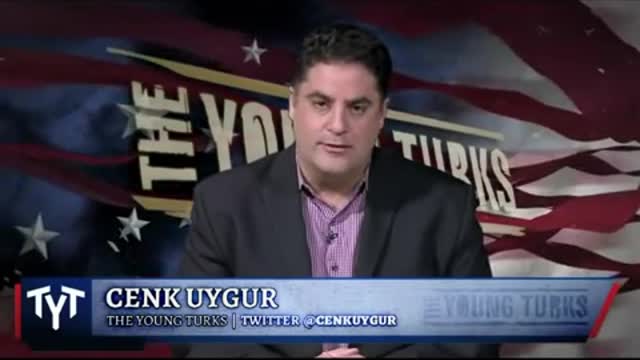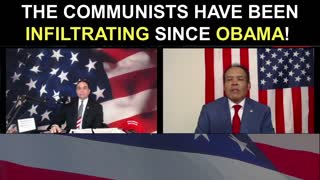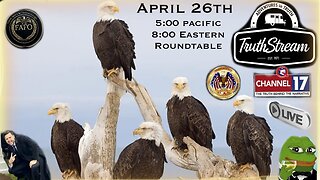Premium Only Content

MLK: I Have a Dream. Obama: I Have a Drone.
A simple twist of fate has set President Obama's second Inaugural Address for January 21, the same day as the Martin Luther King Jr. national holiday.
By Norman Solomon
Obama made no mention of King during the Inauguration four years ago -- but since then, in word and deed, the president has done much to distinguish himself from the man who said "I have a dream."
After his speech at the March on Washington for Jobs and Freedom in August 1963, King went on to take great risks as a passionate advocate for peace.
After his Inaugural speech in January 2009, Obama has pursued policies that epitomize King's grim warning in 1967: "When scientific power outruns moral power, we end up with guided missiles and misguided men."
But Obama has not ignored King's anti-war legacy. On the contrary, the president has gone out of his way to distort and belittle it.
In his eleventh month as president -- while escalating the U.S. war effort in Afghanistan, a process that tripled the American troop levels there -- Obama traveled to Oslo to accept the Nobel Peace Prize. In his speech, he cast aspersions on the peace advocacy of another Nobel Peace laureate: Martin Luther King Jr.
The president struck a respectful tone as he whetted the rhetorical knife before twisting. "I know there's nothing weak -- nothing passive -- nothing naive -- in the creed and lives of Gandhi and King," he said, just before swiftly implying that those two advocates of nonviolent direct action were, in fact, passive and naive. "I face the world as it is, and cannot stand idle in the face of threats to the American people," Obama added.
Moments later, he was straining to justify American warfare: past, present, future. "To say that force may sometimes be necessary is not a call to cynicism -- it is a recognition of history; the imperfections of man and the limits of reason," Obama said. "I raise this point, I begin with this point because in many countries there is a deep ambivalence about military action today, no matter what the cause. And at times, this is joined by a reflexive suspicion of America, the world's sole military superpower."
Then came the jingo pitch: "Whatever mistakes we have made, the plain fact is this: The United States of America has helped underwrite global security for more than six decades with the blood of our citizens and the strength of our arms."
Crowing about the moral virtues of making war while accepting a peace prize might seem a bit odd, but Obama's rhetoric was in sync with a key dictum from Orwell: "Who controls the past controls the future; who controls the present controls the past."
Laboring to denigrate King's anti-war past while boasting about Uncle Sam's past (albeit acknowledging "mistakes," a classic retrospective euphemism for carnage from the vantage point of perpetrators), Obama marshaled his oratory to foreshadow and justify the killing yet to come under his authority.
Two weeks before the start of Obama's second term, the British daily The Guardian noted that "U.S. use of drones has soared during Obama's time in office, with the White House authorizing attacks in at least four countries: Afghanistan, Pakistan, Yemen and Somalia. It is estimated that the CIA and the U.S. military have undertaken more than 300 drone strikes and killed about 2,500 people."
-
 0:16
0:16
BFDangerous
4 years agoI have a Dream
154 -
 1:43
1:43
Macroyuri
4 years agoIf You Have A Dream
82 -
 0:59
0:59
John Di Lemme - Conservative American Patriot who brings to you the Best of the Best in the Conservative Arena
4 years ago $0.02 earnedThe Communists Have Been INFILTRATING Since Obama!
8431 -
 0:30
0:30
KTNV
4 years agoMartin Luther King Jr's I have a Dream anniversary
425 -
 2:23
2:23
MyAllTimeKaraoke
4 years agoALL I HAVE TO DO IS DREAM - THE EVERLY BROTHERS (karaoke version)
561 -
 1:44
1:44
GaryMArmstrong
4 years agoDream Bathroom
220 -
 4:27:48
4:27:48
ThePope_Live
10 hours agoLIVE - First time playing The Finals in over a YEAR! Still good? with @Arrowthorn
46.6K1 -
 3:06:26
3:06:26
TruthStream with Joe and Scott
16 hours agoRoundtable with Patriot Underground and News Treason Live 4/26 5pm pacific 8pm Eastern
75.7K41 -
 8:52
8:52
Tundra Tactical
14 hours ago $10.84 earnedSCOTUS Denies Appeal, Minnesota Courts Deal 2a Win!
68.3K14 -
 10:36:01
10:36:01
a12cat34dog
16 hours agoONE WITH THE DARK & SHADOWS :: The Elder Scrolls IV: Oblivion Remastered :: FIRST-TIME PLAYING {18+}
92.5K7